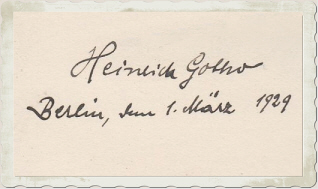| HOME | INDEX
GERMAN MOVIE |
THE
GERMAN
MOVIE |
 |
| HOME | INDEX
GERMAN MOVIE |
THE
GERMAN
MOVIE |
 |
| Heinrich Gotho
1872 - 1938 |
.
.  The actor Heinrich Gotho was born as Heinrich Gottesmann in Dolyna. The actor Heinrich Gotho was born as Heinrich Gottesmann in Dolyna. He began his stage career already in 1890 in Leitmeritz and in the next years he appeared at rather unimportant theatern in Austria-Hungary. Finally he came to Vienna and one year later followed the step to Germany where he gained a foothold on stage in Berlin from 1911. There he was able to assert himself as a stage actor. His first appearance in front of the camera came in 1912 into being with "Die Mauritiusmakre" (12) but this remained a unique performance in the métier for the present. When he met the director Fritz Lang in Berlin he was engaged for several of Lang's movies but also other directors used the expressiveness of Heinrich Gotho. Heinrich Gotho took part in many well-known movies of the 20s and some of them belong to the classic movies of the German silent movie era today. To his most popular works of those years belong "Dr. Mabuse, der Spieler" (22), "Der falsche Dimitri" (22), "Mensch gegen Mensch" (24), "Metropolis" (27), "Der Juxbaron" (27), "Die Liebe der Jeanne Ney" (27), "Moral" (28), "Der Biberpelz" (28), "Wolga Wolga "(28) and "Frau im Mond" (29). He managed the transition to the sound film without any problems and in the next years he impersonated roles in "Liebe im Ring" (30), "Die Försterchristl" (31), "Mary" (31) von Alfred Hitchcock, "M" (31), "Lachende Erben" (33), "Das Testament des Dr. Mabuse" (33) and "Ein Unsichtbarer geht durch die Stadt" (33). His career came to an abrupt end in 1933. As a Jew he had no possibilites to work any longer in the National Socialist Germany. He was banned from working and in 1938 he was excluded from the NS-Reichsfilmkammer. About his further path of life nothing is known as well as if he survived the National Socialism. Other
movies with Heinrich Gotho:
|
| Back |